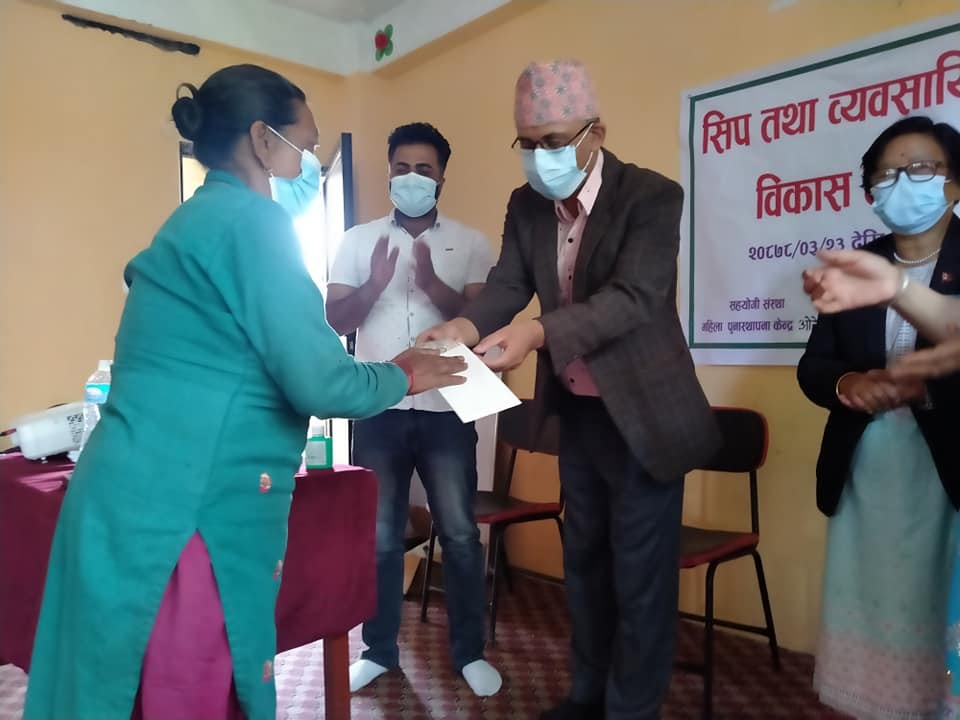
For as long as Ganga Devi Rai can remember, money has been hard to come by. Sixty-Four-years-old Rai lives in Budanilkantha, Kathmandu, along with her son, daughter-in-law and grandson. Since her son is unemployed most of the time, Rai and her daughter-in-law have been selling vegetables and tea to put together meals.
“Ever since my son lost his job at the shoe factory, it has been difficult for him to find a job. He used to work in construction sites as a labourer whenever he could find a job. But most of the time, he has remained jobless. As a result, my daughter-in-law and I shoulder all the responsibilities to run the household,” said Rai.
The financial condition of the Rai household further deteriorated when the prohibitory orders issued on March 29 to curb the spread of Covid-19 initially forbid them to open their shop only till 9 am every day.
“We couldn’t earn much due to the prohibitory orders. As a result, we didn’t have any money to buy needed items for our shop,” said Rai.
The plight of forty-year-old Renu Khadka is also similar to that of Rai’s.
Khadka, who also resides in Kapan, Budhanilkantha with her husband and daughter, owns a grocery shop. Along with that, Khadka also works as a maid, from which she is able to earn four thousand rupees a month. However, Khadka said that the pandemic has drained her savings and increased running costs. On top of that, Khadka also needs to take care of her husband’s medicine, a kidney patient.
“My husband is unable to work due to his health. So, I try to earn from our grocery shop and by working as a maid, but it has always been difficult for me to save money for my husband’s medicine and to pay for my daughter’s tuition fee, who is in grade 4. Pandemic also further made our situation more vulnerable since I had to close my shop most of the time,” said Khadka.
As COVID-19 hammers economies worldwide, in Nepal, the women engaged in the small-scale businesses in the informal economy are bearing the brunt of this economic fallout. A 2017 Nepal Labour Force Survey also shows that 90.5 percent of women in employment are in the informal economy such as agriculture, farming, retail shops, and hospitality sectors--all of the sectors that are heavily affected by the lockdown following the Covid-19 outbreak.
To address the economic vulnerability of female-headed households in the Buddhanilkantha municipality amid the pandemic, on July 9, 2021, WOREC, in coordination with Buddhanilkantha municipality, provided skill-based training and cash support to 15 women affiliated with Pathibhara Women’s Group. Each woman-headed household received 20 thousand rupees to set up and manage small businesses.
Both Rai and Khadka, who are the Pathibhara Women’s Group members, also participated in the training and have received livelihood support, which has enabled them to operate their retail shops.
“In the training, I have learned valuable lessons on how to operate the business. Along with that, the cash support has helped me to be able to buy necessary food items for my shop,” said Khadka.
Rai also said that she and her daughter-in-law would invest the money in their shop. “For us, our shop is the only source of income. We will use the money to buy needed items to sell in the shop,” said Rai.
Sabina Rimal, the program officer at WOREC, said that such training and seed money support is essential for female-headed households since they are the ones who often take care of the children and are most vulnerable during such emergency.
“Such cash support will help them to minimize the economic pressure. At the same time, they will also be able to utilize the money to start or even expand their own business,” said Rimal.
Since investing in women’s economic empowerment sets a direct path towards gender equality and inclusive economic growth, WOREC has been conducting skill-related training programs and providing seed money support to the women with the coordination and cooperation of local level government for the development of women entrepreneurship.